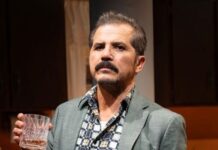Now in its American premiere for a limited engagement at NYC’s Theatre Row, Crooked Cross – a little-known play by English writer Sally Carson, based on her 1934 book of the same name – made its debut in Birmingham in 1935, was presented in London in 1937, and was not staged again until the current production by Mint Theater Company, in keeping with its mission of creating new life for lost or forgotten plays from the past. Directed and slightly revised by The Mint’s Artistic Director Jonathan Bank, who became aware of the work in February, when he was informed that the novel would be republished in the Spring by the UK’s Persephone Books, the present dramatization has cut nine minor characters and restored some of the dialogue from the original book, but every word in the prescient script – telling the story of the divisive and devastating responses of one ordinary middle-class Bavarian family to the rise of Nazism in 1932-33 Germany – was written by Carson herself.
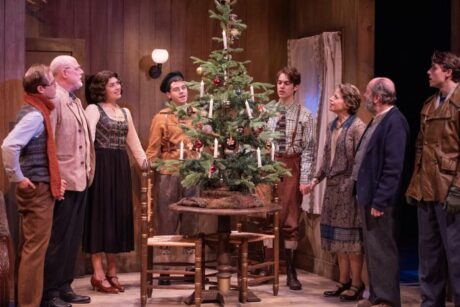
The narrative opens on Christmas Eve of 1932, in the home of the Kluger family, as they decorate the tree and sing traditional German songs. Lexa’s parents have invited her fiancé Moritz Weissman (a doctor and, like his late mother, a Catholic, with “a Jewish name”) and his father (a professor of Jewish descent) to their holiday dinner. They are joined by her two brothers, the unemployed Helmy (to whom she is closest) and Erich, a pompous and overbearing ski instructor at a resort hotel (and gigolo to the older women staying there), and their friend Otto – all three of the young men becoming increasingly involved in the National Socialist Party (the Nazis), in order to have jobs, a sense of pride, stability, and direction, and a place where they belong.
With the Nazis’ election win in March of 1933, and the burgeoning anti-Semitic sentiment in Germany, it’s not long before Moritz and Professor Weissman are fired from their successful careers and move from their home to a small bare flat, his June wedding to Lexa is postponed since he no longer has the income to support a wife and family, and she is warned by her brothers that she must stop seeing him. But her love for Moritz and desire to be with him are unwavering, so they continue to meet in secret and she writes letters to him when they’re apart, as is soon discovered by the disapproving Erich and disclosed to the concerned Helmy, causing a rift between the previously close-knit siblings and resulting in his later declaration, “First I’m a good Nazi . . . after that I’m your brother.”
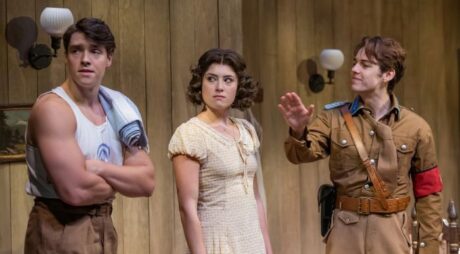
There are deeply disturbing scenes of the couple watching fireworks on New Year’s Eve and sighting an illuminated swastika (the “crooked cross” of the title) on high; a dance they attended in mid-April on two floors of a hotel, with only the official members of the Party welcome upstairs and an incident of a young Nazi hurling racist epithets at Moritz downstairs (based on an actual occurrence Carson witnessed while visiting friends in Germany); the face-to-face confrontations of the Krugers, torn apart by their divided alliances; a devastating (but not surprising) climax on Midsummer Night’s Eve, as Moritz and Lexa quietly make their way across Nagelspitz Mountain in the Bavarian Alps, in an attempt to escape what their country has become; and the family’s reaction to it – some unknowing and some fully aware of what transpired.
Carson’s writing and Bank’s direction are clear, slow-paced, and deliberate, allowing the characters to express their feelings towards each other, commitment to their beliefs, rationale for the decisions they make, and disagreements about them, occasionally injecting bits of humor or erupting into bursts of anger, but always relaying a sense of the individual personalities and an explanation of why they’ve chosen to do what they do. Leading the cast and the central love story are Ella Stevens (making her New York debut) as Lexa and Samuel Adams as Moritz, whose enduring devotion and determination to remain together in defiance of the steadily encroaching Nazism drive the narrative and provide a tender and poignant human element the audience can root for in the face of man’s inhumanity to man.
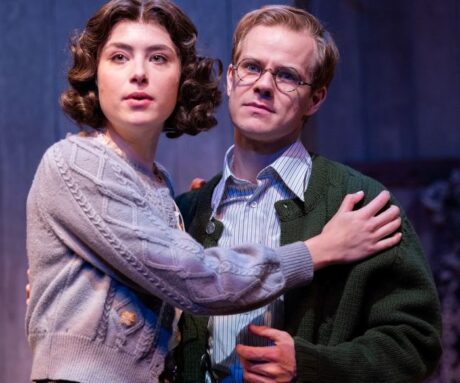
Gavin Michaels as Helmy and Jakob Winter as Erich turn in compelling performances that distinguish between the brothers’ attitudes and motivations and their shifting relationships with Lexa and their parents. Jack Mastrianni’s Otto, their selection for a new love interest for their sister after encouraging her to leave Moritz, is sweetly enamored of her and helpful when she needs him, though she doesn’t reciprocate his feelings. Representing the older generation of the family are Liam Craig as Kruger and Katie Firth as Frau Kruger, capturing the gradual change in them, from initially embracing Moritz and his father and withholding their support of the Party, then gradually being drawn in by their sons and the Nazis’ widespread popularity. Professor Weissman, portrayed by Douglas Rees, tries to remain calm through the growing threat and to stay on friendly terms with Helmy, but suffers the ramifications of the rampant anti-Semitism sweeping through Germany. Rounding out the cast is Ben Millspaugh as an unnamed Young Man, who makes a key appearance that advances the plot with significant revelations.
The show’s historicizing artistic design transports us to Bavaria in the 1930s, with the actors dressed in period-style clothing, Nazi uniforms, and authentic Bavarian dress, including dirndls for the women and lederhosen for the men (costumes by Hunter Kaczorowski). A rotating set (by Alexander Woodward) and props (by Chris Fields) transition easily from the warm interior of the Krugers’ home and its vintage gramophone to the starkness of the Weissmans’ apartment, to the hotel bar with a single cocktail table before the closed stage curtain, and projections (by Joey Moro) of the fireworks display and Moritz and Lexi’s escape route through Nagelspitz Mountain are enhanced with changes in lighting (by Christian DeAngelis ) and the ambient sound (by Sean Hagerty) of the exploding fireworks, chanting mobs, and gunshots.
With its socio-political theme of the Nazis’ horrific attempt to make Germany great again through unbridled bigotry and murderous hatred, luring citizens in with the promise of employment, a better economy, and being an important part of it all, Crooked Cross offers an insightful, resonant, and timely warning not to value money and power over humanity or to repeat the history that Sally Carson so clearly saw coming.
Running Time: Approximately two hours, including an intermission.
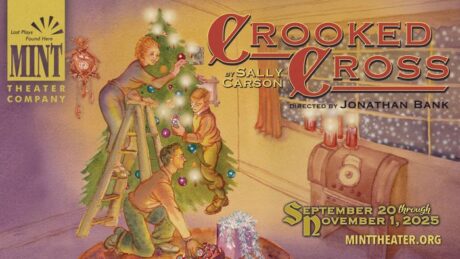
Crooked Cross plays through Saturday, November 1, 2025, at the Mint Theater Company, performing at Theatre Row, Stage 4, 410 W 42nd Street, NYC. For tickets (priced at $39-95, including fees), go online, or find discount tickets at TodayTix.



